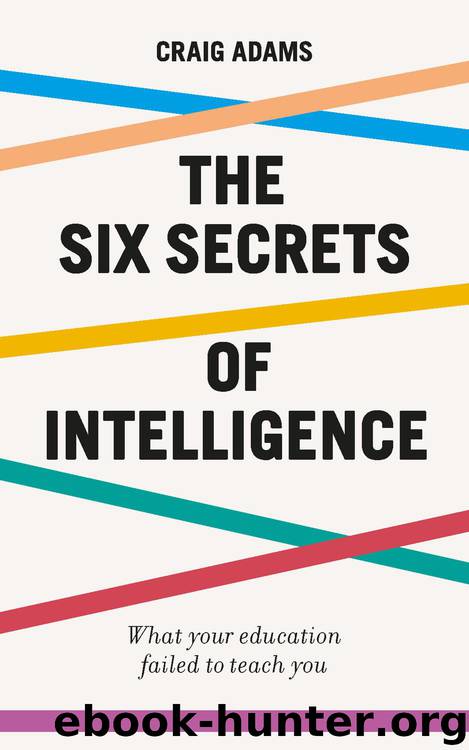The Six Secrets of Intelligence by Craig Adams

Author:Craig Adams [Craig Adams]
Language: eng
Format: epub
ISBN: 9781785785078
Publisher: Icon Books Ltd
Published: 2019-02-15T16:00:00+00:00
If Only Truth Were Simple: The Three Questions You Can’t Ignore
We’re forced to use deduction, induction and analogy no matter what we want to prove and no matter what we argue about, but the fact that reasoning works in the same way regardless of the topic of an argument reveals that it has a weakness. Reasoning sees no depth or subtlety in the ingredients that it adds together. We can reason with premises like ‘Socrates invented the iPad’ or ‘the iPad invented Socrates’ and come up with false or meaningless conclusions, because reasoning’s job is to work with what it’s been given, not to think about it. When a deduction starts from premises that aren’t true, the result is something that isn’t true even when the logic is flawless. Reasoning is a process that’s blind to meaning, assumptions and even truth itself; being logical doesn’t make you right.
This inability of what we call ‘logic’ or ‘reason’ to say anything about the ingredients with which it cooks its dishes explains why the sophists produced more clever-sounding debaters than they did intelligent thinkers. To separate subtle from simplistic truth and to be able to think in different ways about completely different subjects, we need more than the principles of reasoning: we need principles of truth.
But what leads to truth? What proves that we’re right? The answer is evidence. Evidence is what we look for to point us in the direction of truth and it’s what wins arguments. There is no truth without evidence, and that’s why what counts as evidence? is the third question of philosophy. But how do we decide what counts as evidence? What Aristotle noticed was that this question can’t be answered until we’ve decided on an answer to the first question of philosophy: what’s real?
The fact that the things we investigate are fundamentally different in nature – the fact that they exist in completely different ways – presents us with a problem. When we first start to study something, whether it’s God, justice, racism, the mind or the Sun, we have to make some sort of tentative decision about what it is, and as Aristotle warns us, ‘our answer to this question is of the greatest importance’.
The reason why what counts as evidence? is determined by what’s real? is that our evidence has to be appropriate for whatever it is that we investigate. Take, for example, theology: the study of god(s). The nature of many things is mysterious, but none perhaps more so than God. What exactly God is and in what way God exists are perplexing questions, but one thing can be said for certain: God does not exist in the same way that a lump of coal exists.
We can’t see, measure or in any way track God’s movements. In so far as a lump of coal is a physical object, we can describe its appearance and test its properties by subjecting it to physical experiments. We can physically play around with coal and use what we find as evidence to tell us what’s true about it.
Download
This site does not store any files on its server. We only index and link to content provided by other sites. Please contact the content providers to delete copyright contents if any and email us, we'll remove relevant links or contents immediately.
| Administration | Assessment |
| Educational Psychology | Experimental Methods |
| History | Language Experience Approach |
| Philosophy & Social Aspects | Reform & Policy |
| Research |
The Art of Coaching Workbook by Elena Aguilar(51151)
Trainspotting by Irvine Welsh(21633)
Twilight of the Idols With the Antichrist and Ecce Homo by Friedrich Nietzsche(18618)
Fangirl by Rainbow Rowell(9226)
Periodization Training for Sports by Tudor Bompa(8249)
Change Your Questions, Change Your Life by Marilee Adams(7733)
This Is How You Lose Her by Junot Diaz(6872)
Asking the Right Questions: A Guide to Critical Thinking by M. Neil Browne & Stuart M. Keeley(5752)
Grit by Angela Duckworth(5597)
Red Sparrow by Jason Matthews(5462)
Paper Towns by Green John(5174)
Room 212 by Kate Stewart(5102)
Ken Follett - World without end by Ken Follett(4719)
Housekeeping by Marilynne Robinson(4434)
The Sports Rules Book by Human Kinetics(4377)
Double Down (Diary of a Wimpy Kid Book 11) by Jeff Kinney(4257)
Papillon (English) by Henri Charrière(4252)
The Motorcycle Diaries by Ernesto Che Guevara(4084)
Exercise Technique Manual for Resistance Training by National Strength & Conditioning Association(4057)
